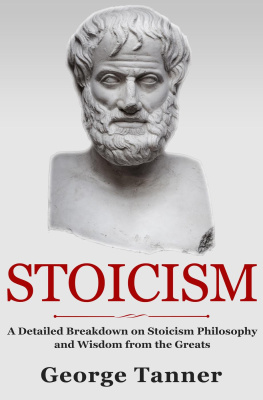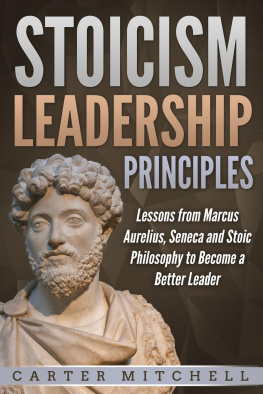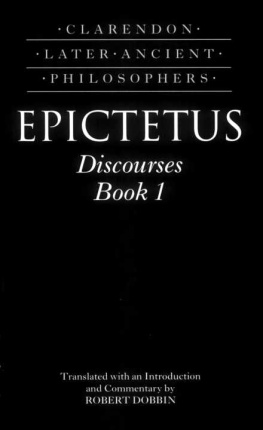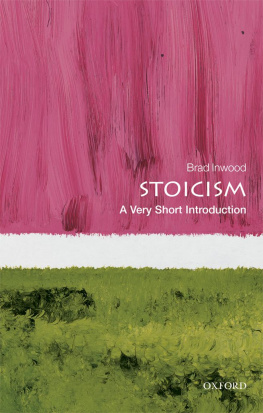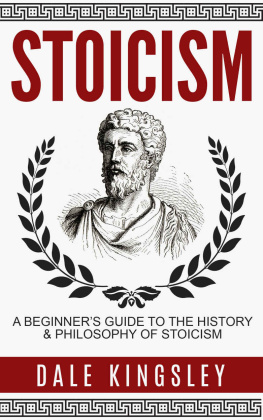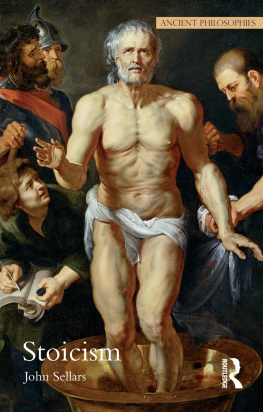St. George Stock - A Guide to Stoicism
Here you can read online St. George Stock - A Guide to Stoicism full text of the book (entire story) in english for free. Download pdf and epub, get meaning, cover and reviews about this ebook. year: 2012, publisher: Duke Classics, genre: Science. Description of the work, (preface) as well as reviews are available. Best literature library LitArk.com created for fans of good reading and offers a wide selection of genres:
Romance novel
Science fiction
Adventure
Detective
Science
History
Home and family
Prose
Art
Politics
Computer
Non-fiction
Religion
Business
Children
Humor
Choose a favorite category and find really read worthwhile books. Enjoy immersion in the world of imagination, feel the emotions of the characters or learn something new for yourself, make an fascinating discovery.
- Book:A Guide to Stoicism
- Author:
- Publisher:Duke Classics
- Genre:
- Year:2012
- Rating:5 / 5
- Favourites:Add to favourites
- Your mark:
- 100
- 1
- 2
- 3
- 4
- 5
A Guide to Stoicism: summary, description and annotation
We offer to read an annotation, description, summary or preface (depends on what the author of the book "A Guide to Stoicism" wrote himself). If you haven't found the necessary information about the book — write in the comments, we will try to find it.
One of the most influential schools of classical philosophy, stoicism emerged in the third century BCE and later grew in popularity through the work of proponents such as Seneca and Epictetus. This informative introductory volume provides an overview and brief history of the stoicism movement.
A Guide to Stoicism — read online for free the complete book (whole text) full work
Below is the text of the book, divided by pages. System saving the place of the last page read, allows you to conveniently read the book "A Guide to Stoicism" online for free, without having to search again every time where you left off. Put a bookmark, and you can go to the page where you finished reading at any time.
Font size:
Interval:
Bookmark:

First published in 1908
ISBN 978-1-62012-307-2
Duke Classics
2012 Duke Classics and its licensors. All rights reserved.
While every effort has been used to ensure the accuracy and reliability of the information contained in this edition, Duke Classics does not assume liability or responsibility for any errors or omissions in this book. Duke Classics does not accept responsibility for loss suffered as a result of reliance upon the accuracy or currency of information contained in this book.
If you strip Stoicism of its paradoxes and its wilful misuse oflanguage, what is left is simply the moral philosophy of Socrates,Plato and Aristotle, dashed with the physics of Heraclitus. Stoicismwas not so much a new doctrine as the form under which the old Greekphilosophy finally presented itself to the world at large. It owedits popularity in some measure to its extravagance. A great dealmight be said about Stoicism as a religion and about the part itplayed in the formation of Christianity but these subjects wereexcluded by the plan of this volume which was to present a sketch ofthe Stoic doctrine based on the original authorities.
ST. GEORGE STOCK, M A
Pemb. Coll. Oxford
Among the Greeks and Romans of the classical age philosophy occupiedthe place taken by religion among ourselves. Their appeal was toreason not to revelation. To what, asks Cicero in his Offices, are weto look for training in virtue, if not to philosophy? Now, if truthis believed to rest upon authority it is natural that it should beimpressed upon the mind from the earliest age, since the essentialthing is that it should be believed, but a truth which makes itsappeal to reason must be content to wait till reason is developed. Weare born into the Eastern, Western or Anglican communion or someother denomination, but it was of his own free choice that theserious minded young Greek or Roman embraced the tenets of one of thegreat sects which divided the world of philosophy. The motive whichled him to do so in the first instance may have been merely theinfluence of a friend or a discourse from some eloquent speaker, butthe choice once made was his own choice, and he adhered to it assuch. Conversions from one sect to another were of quite rareoccurrence. A certain Dionysius of Heraclea, who went over from theStoics to the Cyrenaics, was ever afterward known as "the deserter."It was as difficult to be independent in philosophy as it is with usto be independent in politics. When a young man joined a school, hecommitted himself to all its opinions, not only as to the end oflife, which was the main point of division, but as to all questionson all subjects. The Stoic did not differ merely in his ethics fromthe Epicurean; he differed also in his theology and his physics andhis metaphysics. Aristotle, as Shakespeare knew, thought young men"unfit to hear moral philosophy". And yet it was a questionorrather the questionof moral philosophy, the answer to which decidedthe young man's opinions on all other points. The language whichCicero sometimes uses about the seriousness of the choice made inearly life and how a young man gets entrammelled by a school beforehe is really able to judge, reminds us of what we hear said nowadaysabout the danger of a young man's taking orders before his opinionsare formed. To this it was replied that a young man only exercisedthe right of private judgment in selecting the authority whom heshould follow, and, having once done that, trusted to him for all therest. With the analogue of this contention also we are familiar inmodern times. Cicero allows that there would be something in it, ifthe selection of the true philosopher did not above all thingsrequire the philosophic mind. But in those days it was probably thecase, as it is now, that, if a man did not form speculative opinionsin youth, the pressure of affairs would not leave him leisure to doso later.
The life span of Zeno, the founder of Stoicism, was from B.C. 347 to275. He did not begin teaching till 315, at the mature age of forty.Aristotle had passed away in 322, and with him closed the greatconstructive era of Greek thought. The Ionian philosophers hadspeculated on the physical constitution of the universe, thePythagoreans on the mystical properties of numbers; Heraclitus hadpropounded his philosophy of fire, Democritus and Leucippus hadstruck out a rude form of the atomic theory, Socrates had raisedquestions relating to man, Plato had discussed them with all thefreedom of the dialogue, while Aristotle had systematically workedthem out. The later schools did not add much to the body ofphilosophy. What they did was to emphasize different sides of thedoctrine of their predecessors and to drive views to their logicalconsequences. The great lesson of Greek philosophy is that it isworth while to do right irrespective of reward and punishment andregardless of the shortness of life. This lesson the Stoics soenforced by the earnestness of their lives and the influence of theirmoral teaching that it has become associated more particularly withthem. Cicero, though he always classed himself as an Academic,exclaims in one place that he is afraid the Stoics are the onlyphilosophers, and whenever he is combating Epicureanism his languageis that of a Stoic. Some of Vergil's most eloquent passages seem tobe inspired by Stoic speculation. Even Horace, despite his banterabout the sage, in his serious moods borrows the language of theStoics. It was they who inspired the highest flights of declamatoryeloquence in Persius and Juvenal. Their moral philosophy affected theworld through Roman law, the great masters of which were brought upunder its influence. So all pervasive indeed was this moralphilosophy of the Stoics that it was read by the Jews of Alexandriainto Moses under the veil of allegory and was declared to be theinner meaning of the Hebrew Scriptures. If the Stoics then did notadd much to the body of Philosophy, they did a great work inpopularising it and bringing it to bear upon life.
An intense practicality was a mark of the later Greek philosophy.This was common to Stoicism with its rival Epicureanism. Bothregarded philosophy as 'the art of life,' though they differed intheir conception of what that art should be. Widely as the twoschools were opposed to one another, they had also other features incommon. Both were children of an age in which the free city had givenway to monarchies, and personal had taken the place of corporatelife. The question of happiness is no longer, as with Aristotle, andstill more with Plato, one for the state, but for the individual. Inboth schools the speculative interest was feeble from the first, andtended to become feebler as time went on. Both were new departuresfrom pre-existent schools. Stoicism was bred out of Cynicism, asEpicureanism out of Cyrenaicism. Both were content to fall back fortheir physics upon the pre-Socratic schools, the one adopting thefirm philosophy of Heraclitus, the other the atomic theory ofDemocritus. Both were in strong reaction against the abstractions ofPlato and Aristotle, and would tolerate nothing but concrete reality.The Stoics were quite as materialistic in their own way as theEpicureans. With regard indeed to the nature of the highest god wemay, with Senaca represent the difference between the two schools asa question of the senses against the intellect, but we shall seepresently that the Stoics regarded the intellect itself as being akind of body.
Font size:
Interval:
Bookmark:
Similar books «A Guide to Stoicism»
Look at similar books to A Guide to Stoicism. We have selected literature similar in name and meaning in the hope of providing readers with more options to find new, interesting, not yet read works.
Discussion, reviews of the book A Guide to Stoicism and just readers' own opinions. Leave your comments, write what you think about the work, its meaning or the main characters. Specify what exactly you liked and what you didn't like, and why you think so.



